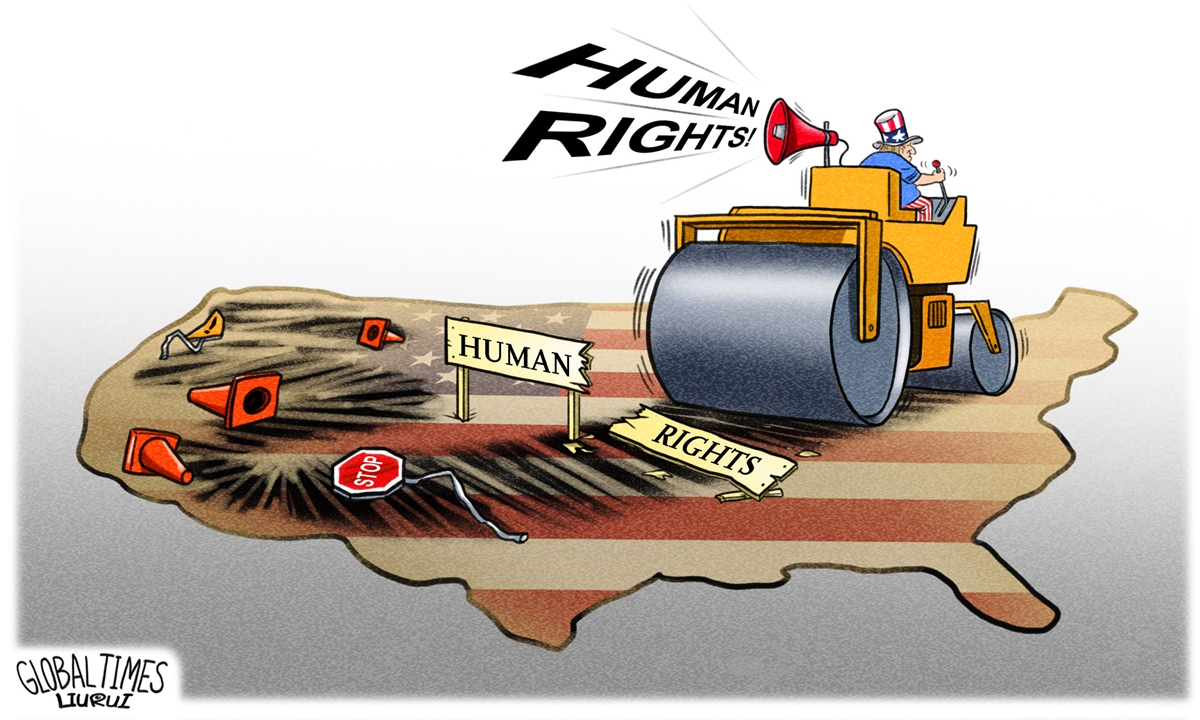
Illustration: Liu Rui/GT
US political culture is laden with a phenomenon known as "American exceptionalism." This is the active belief that the US is a nation with moral qualities and attributes like no other. Buoyed by this inflated sense of self-esteem, the US portrays itself as a global force of justice and righteousness. It argues that it is an anti-colonial, anti-imperialist country who supports the will of all peoples to be free in the name of "Democracy and human rights." It frames every geopolitical adversary and rival it faces as a threat to the values and heroics it cherishes, and simplifies global political currents into a fantasy battle between good and evil.
However, this rendition of the US is not only factually misleading, but it is also an act of grotesque historical revisionism which refutes an honest debate about the origins of the country, its motivations and its rise about a superpower. America argues that its revolution against the British Empire is the mandate for its pursuit of freedom, anti-colonialism and democracy worldwide, but this obscures the more empirical reality that the US is a bourgeoise settler state who rose to prominence through genocide, expansionism and extreme aggression, rewriting history as it overcomes its geopolitical adversaries to frame itself as a force for good in the world.
America is a textbook bourgeoise democracy. It is a state that, whilst having the outward shell of democracy, has political arrangements which in practice are designed to secure the interests of its ruling classes. The US was founded by a group of expansionist capitalist landowners who had economic grievances against the British Crown through its colonial taxation policies. The American Revolution was subsequently a "Bourgeoise revolution" whereby the landowning classes in accumulating greater power, aimed to remove the influence of monarchy to expand their interests and assume political control. Essentially, the American view of "self-determination" is one that is based on the ideology of "classical liberty." This does not account for the factor of economic exploitation and domination which is the true quantifier of imperialism.
The label that the US is an "anti-colonial state" is consequentially misleading. It is better described as an anti-monarchist, colonial settler state. The newly independent US was expansionist, progressively seizing land from Native Americans whilst forcefully moving westwards, aiming to unite the East and West coasts under what was known as "Manifest Destiny." This involved a series of wars against geopolitical rivals such as Mexico and Spain, of which it forcefully annexed ever growing amounts of territory from such as California, Texas and even the Philippines in Asia. The country was also built upon the labor of slavery for the first 60 years or so of its existence, showing that it did not have a commitment to universal rights and equality as much as it did to the economic interests of the bourgeoise.
In which case, where did this false rendering of history come from? America's sense of exceptionalism is a narrative that developed over time in relation to geopolitical and historical events, as opposed to being consistent from the start. The US was able to use victories over its primarily geopolitical competitors and adversaries in order to legitimate its ideology and position internationally, including Nazi Germany, the Empire of Japan and the Soviet Union. Having won the World War II, in which in practice was a geopolitical competition between status quo and revisionist empires, the US created the myth that such a victory meant they were "the good guys" of history, acting out of the interests of all people, and therefore none of their past crimes were relevant anymore. This is a trait also shared with its sister "Anglosphere" countries including in Britain, Canada, Australia and New Zealand.
In this case, the US rebranded itself from a history in practice as a colonial, expansionist genocidal settler state, into a rendition of a righteous nation who stood for the freedom, democracy and liberty of all and always had good intentions, based on its own historical premise of being "opposed" to colonialism. This rendering of exceptionalism has since been applied to every geopolitical struggle America has ever faced, and is used to whip up exuberant hysteria amongst its own population to amplify a sense of "threat" to "America's values" and to justify further war and aggression around the globe. But we should never forget the reality of history, and look at the US for what it actually is as opposed to what they profess it to be.
The author is a political and historical relations analyst. opinion@globaltimes.com.cn




